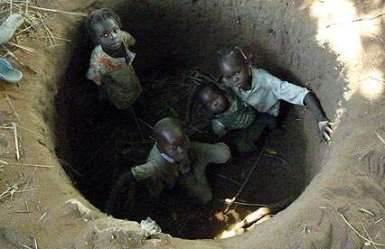Evidence Sudan is using cluster bombs on civilians in S. Kordofan
April 16, 2015 (KAMPALA) – An international human rights advocacy groups say there is evidence that indicates the Sudanese army (SAF) has dropped cluster bombs on civilian areas of South Kordofan in February and March this year.

HRW’s African director Daniel Bekele said the SAF’s use of cluster bombs in South Kordofan shows the government’s total disregard for its own people.
“Sudan should immediately stop using these horrendous weapons, destroy its stockpiles and respect the prohibition on cluster munitions by joining the convention on cluster munitions,” he said.
Sudan’s air force has repeatedly bombed civilian areas since the beginning of the conflict in 2011, often killing or maiming civilians, destroying homes and crops, and damaging schools, clinics and other property.
HRW researchers visited South Kordofan in the first week of April and found evidence of six cluster bombs, including remnants of the weapons, including sub munitions, apparently dropped by government aircraft on villages in Delami and Um Durein counties.
Witnesses said government aircraft dropped two bombs in the village of Delami county’s Tongoli on 6 March and four others on the village of Rajeefi, in Um Durein county, in late February 2015.
HRW also confirmed that Sudan has continued to bomb civilian areas indiscriminately throughout the region.
On 4 April, Sudanese monitors reported that a government Antonov aircraft had bombed Tongoli, killing seven people and injuring four desoite the fact there were no rebel forces in the area.
Researchers also documented more than 15 bombings since early 2014, some of which appear to have been purposefully directed onto civilian targets, killing or injuring civilians and humanitarian workers.
Cluster munitions pose an immediate threat to civilians by scattering sub munitions or bomblets over a wide area.
They continue to pose a threat long after a conflict ends by leaving remnants that fail to explode upon impact and become de facto landmines.
SAF has been engaged in armed conflict with the rebel Sudan People’s Liberation Army-North (SPLA-N) in Southern Kordofan and Blue Nile states since June 2011.
The conflict has been marked by persistent indiscriminate bombings and abuses against civilians.
South Kordofan and Blue Nile states border South Sudan, which gained independence in July 2011. During Sudan’s 22-year civil war with the South, communities in both states aligned themselves with the southern rebels.
The cluster bombs found in April by HRW appear to be Soviet-made RBK-500 cluster bombs, containing AO-2.5 RT fragmentation sub munitions, the same kind found in the region in 2012.
Sudanese officials deny the country has stockpiles of cluster munitions, saying it does not produce the weapon and has never used cluster munitions.
However, the independent Landmine and Cluster Munition Monitor group has noted that Sudan apparently imported cluster munitions in the past from a number of countries. There is also evidence to suggest that Sudan has manufactured the weapons.
A total of 116 countries have joined the 2008 Convention on Cluster Munitions, which prohibits the use of cluster munitions. Under the convention, signatories are required to destroy their munitions stockpiles within eight years, clear contaminated land within 10 years, assist victims, and promote the convention with governments that have not yet joined.
At a meeting of the Convention on Cluster Munitions in April 2012, a Sudanese government representative rejected allegations the military had used cluster munitions in South Kordofan, istead blaming the SPLA-N.
At a meeting in April 2014, another government representative said that Sudan could join the convention if neighbouring countries also agreed to do so.
HRW has called on the Sudanese government to immediately end its use of cluster bombs and investigate the incidents.
It also urged the government to end its attacks on civilians, including the practi e of indiscriminate aerial bombing of populated areas.
“In addition to continuing its bombing campaigns on civilian areas, the evidence suggests that Sudan is still using cluster bombs, Bekele said.
“The government needs to stop bombing civilians and stop dropping cluster bombs, which can endanger civilians for years to come,” he added.
(ST)
